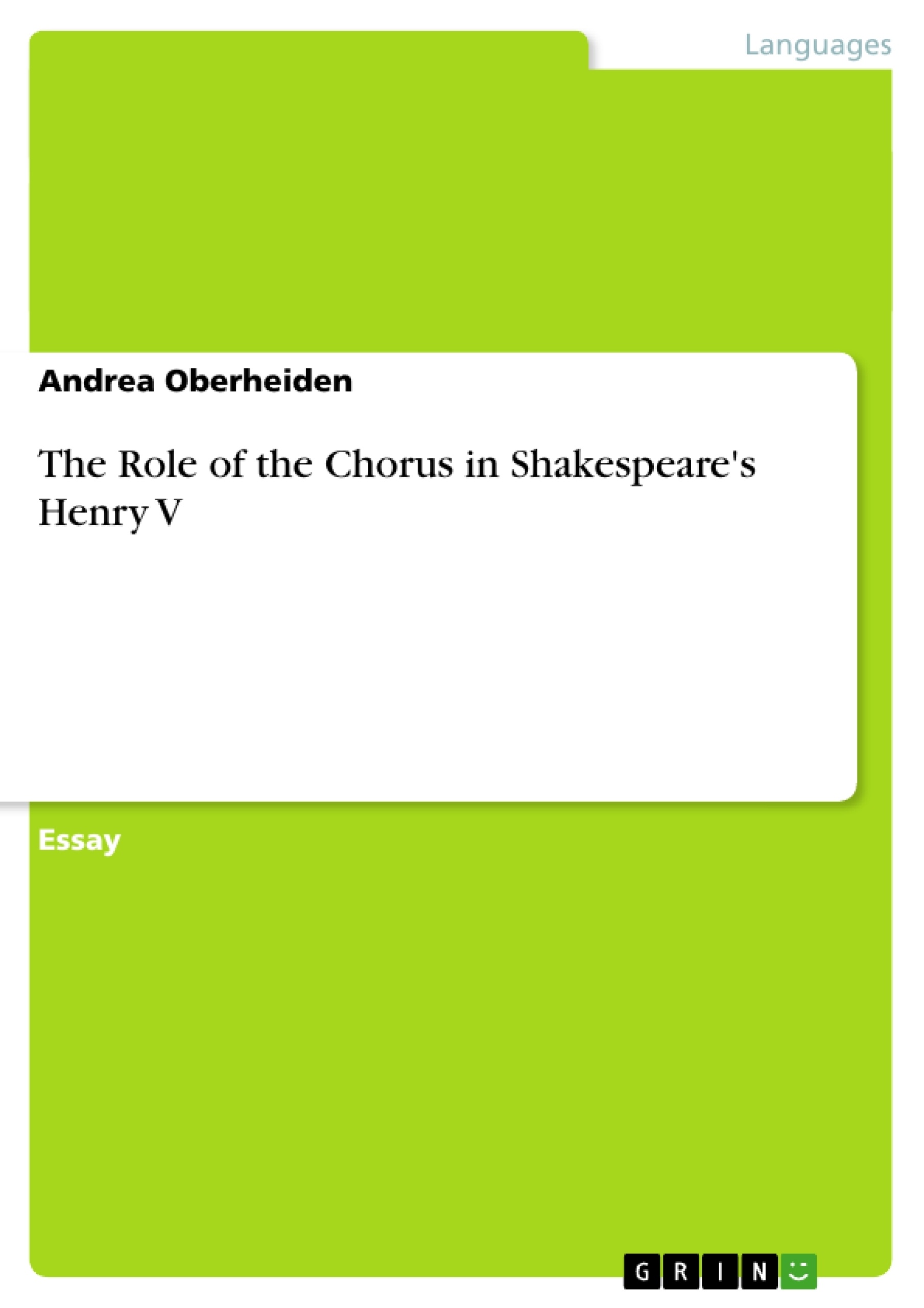At first view, the Chorus in Shakespeare’s Henry V simply seems to serve two main practical purposes: to lead the audience through the play as regards content, and to form the audience's view on the character of King Henry V himself.
The Chorus with his announcements, explanations, apologies, and appeals to the audience, while itself not being part of the diegetic world, underscores the assumption that the Chorus, represented by one single character, functions as a presenter of the play in general and of each act in particular with the rather practical aim to lead the audience through several changes of time and scene: "Carry them [the kings] here and there, jumping o’er times" (1.29).
But understanding that as a reason or even as a justification for the existence of the Chorus in Henry V, the question has to be raised why a chorus, which is after all rarely used in Shakespeare’s other plays, is used specifically in this play. There are numerous Shakespearean plays in which a unifying authority would have been highly useful because of a complex structure of the particular play in regard to time and setting such as in Macbeth, King Lear, or The Merchant of Venice, to mention just a few.
Table of Contents
- The Role of the Chorus in Shakespeare's "Henry V"
- The Chorus as Theatrical Device
- The Chorus and the Play's Themes
- The Chorus's Contradictions
- Myth, History, and the Chorus
- The Chorus's Universal Message
Objectives and Key Themes
This essay examines the role of the Chorus in Shakespeare's "Henry V," analyzing its purpose beyond simply guiding the audience through the play. It investigates how the Chorus, while seemingly glorifying King Henry, actually contributes to a more complex understanding of his character and the play's themes.
- The nature and purpose of the Chorus in Elizabethan drama
- The Chorus's portrayal of King Henry V and its relationship to reality
- The role of myth and history in shaping the play's themes
- The Chorus's use of rhetorical devices and contradictions to convey deeper meaning
- The universal themes of leadership, ambition, and political instability explored through the Chorus's commentary
Chapter Summaries
The essay begins by exploring the Chorus's practical functions in the play, highlighting its role as a guide for the audience through changes in time and location. However, it quickly delves into the question of why a Chorus, a relatively uncommon device in Shakespeare's works, is employed specifically in "Henry V." The essay then analyzes the Chorus's portrayal of King Henry, revealing potential contradictions between his praise and the actions presented on stage.
The essay continues by examining the historical context of the theatrical Chorus, tracing its development from ancient Greek drama to Elizabethan drama. The essay explores how the Chorus in "Henry V," while not directly participating in the action, addresses the audience, attempting to guide their perspective through dramatic speeches.
Further analysis focuses on the inherent contradictions between the Chorus's statements and the events of the play, questioning the reliability of the Chorus's pronouncements. The essay then examines the Chorus's use of myth and history, highlighting how the play transcends a simple historical retelling and explores universal themes.
The essay concludes by exploring the universal message conveyed by the Chorus, emphasizing the cyclical nature of leadership and the inevitability of political instability. The Chorus's portrayal of King Henry, while seemingly celebratory, also underscores the complexities of human ambition and the fleeting nature of power.
Keywords
The essay examines the Chorus in Shakespeare's "Henry V" focusing on its theatrical function, its role in shaping the audience's perception of King Henry, the play's use of history and myth, and the universal themes of leadership, ambition, and political instability. Key concepts include: Chorus, Elizabethan drama, Henry V, King Henry, myth, history, leadership, ambition, political instability, contradiction, theatricality, audience, and the role of rhetoric.
- Quote paper
- Andrea Oberheiden (Author), 2009, The Role of the Chorus in Shakespeare's Henry V, Munich, GRIN Verlag, https://www.grin.com/document/138277




